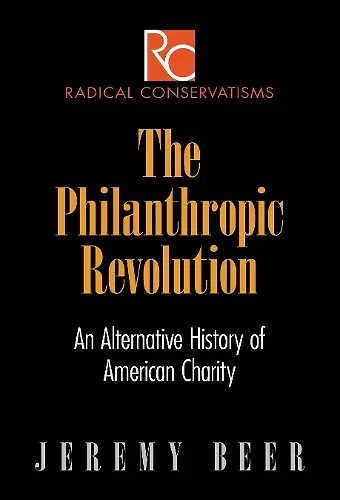The Philanthropic Revolution
An Alternative History of American Charity
Format:Hardback
Publisher:University of Pennsylvania Press
Published:4th Jun '15
Currently unavailable, and unfortunately no date known when it will be back

The historical displacement of charity by philanthropy represents a radical transformation in how we think about voluntary giving. The consequences of this shift have been socially revolutionary.
When we talk about voluntary giving today, we usually prefer the word philanthropy to charity. Why has this terminological shift taken place? What is its philosophical significance? How did philanthropy come to acquire so much prestige—and charity come to seem so old-fashioned? Was this change contested? Does it matter?
In The Philanthropic Revolution, Jeremy Beer argues that the historical displacement of charity by philanthropy represents a radical transformation of voluntary giving into a practice primarily intended to bring about social change. The consequences of this shift have included secularization, centralization, the bureaucratization of personal relations, and the devaluing of locality and place.
Beer shows how the rise of "scientific charity" and the "new philanthropy" was neither wholly unchallenged nor entirely positive. He exposes the way modern philanthropy's roots are entangled with fear and loathing of the poor, anti-Catholic prejudice, militarism, messianic dreams, and the ideology of progress. And he reveals how a rejection of traditional charity has sometimes led philanthropy's proponents to champion objectionable social experiments, from the involuntary separation of thousands of children from their parents to the forced sterilizations of the eugenics movement.
Beer's alternative history discloses that charity is uniquely associated with personalist goods that philanthropy largely excludes. Insofar as we value those goods, he concludes, we must look to inject the logic of charity into voluntary giving through the practice of a modified form of giving he calls "philanthrolocalism."
In this marvelous history of American charitable giving, Jeremy Beer helps us see what we have lost in the triumph of outcomes-focused and "scientific" philanthropy. He argues for the recovery of an older face-to-face charity that humanizes both giver and recipient. * R. R. Reno, Editor, First Things *
In The Philanthropic Revolution, Jeremy Beer succeeds in his two-pronged effort to delineate charity from philanthropy, both in their actual practice and in their distinct origins, and to expose the long-ignored skeletons of philanthropy's deep, historical closets. All of this, achieved in no more than 110 pages, is a testament to Beer's intellectual acuity. Delicately balancing descriptive, historical narration and normative analysis, Beer portrays philanthropy's protracted effort to effectively crowd out traditional charity while emphasizing the importance of those "personalist" goods that were lost in the caustic conflict. * The University Bookman *
Jeremy Beer has written a synthetic masterpiece that triples as a history, interrogation, and indictment of modern professional philanthropy. * Walter A. McDougall, Pulitzer Prize-winning author and historian *
It is a testament to philanthropy's epistemic dominance within contemporary discourse on doing good that one rarely encounters any real challenge to its authority. But with his recent book, Jeremy Beer does precisely that. Elegantly, concisely, and passionately argued, The Philanthropic Revolution chronicles an alternative tradition, a counter-ethic, grounded in the practice of charity, a sense of place, and a commitment to the promotion of authentic human communion. Beer's important intervention should be read by all who care about making a difference in this world-even, and perhaps most urgently by, philanthropy's fiercest partisans. * Benjamin Soskis, Center for Nonprofit Management, Philanthropy, and Policy, George Mason University *
ISBN: 9780812247930
Dimensions: unknown
Weight: unknown
134 pages